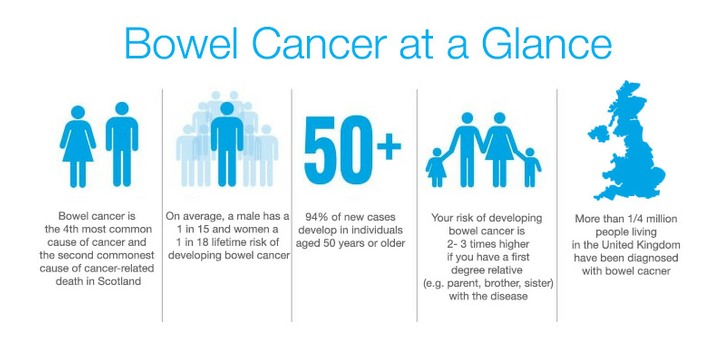Rising Bowel Cancer Cases and Misdiagnosis in Young People

An alarming and mysterious rise in bowel cancer cases among young adults, particularly those under 50, is becoming a significant global health concern. Studies show rates increasing in 27 out of 50 nations, with England experiencing an average annual rise of 3.6 percent in younger adults.
This demographic, aged 20 to 49, has seen diagnoses increase by up to 23 percent over recent decades, challenging the long-held perception that bowel cancer is primarily a disease of older age groups. Disturbingly, this trend is observed not only in individuals linked to risk factors like obesity but also in otherwise fit and healthy patients, leading experts to investigate potential environmental factors such as modern diets, exposure to microplastics, pollution, and even E.coli.

Photo Credit: GCC
Many young individuals initially dismiss critical symptoms, attributing them to more benign causes. Jenna Borthwick, a 31-year-old working mother, explained away early signs like tiredness, cramps, and frequent colds as effects of her demanding lifestyle or nursery bugs. It was only when more pronounced physical symptoms emerged—needing the toilet every time she ate, blood in her faeces, severe abdominal cramps, and a constant urge to empty her bowels—that she sought medical attention.
A crucial piece of misinformation she highlighted was the belief that only dark blood in stool is concerning; she emphasized that any blood, bright red or otherwise, warrants immediate medical investigation. Her diligence led to a colonoscopy, which revealed a tumor so large it was nearing a full bowel obstruction, diagnosed as Stage 3 cancer, prompting rapid surgery and chemotherapy.
Similarly, Krystal Maeyke, then 37, initially attributed sharp, stabbing stomach pains to a food allergy, despite being fit and healthy. For three months, these pains escalated, eventually bringing her to her knees. She also experienced chronic fatigue, irregular bowel movements (which she mistook for IBS), and persistent night sweats.
By the time she was diagnosed, Ms. Maeyke had Stage 4 terminal metastatic bowel cancer, which had spread to her abdomen, liver, and ovaries. Her experience, and feeling each stabbing pain as the cancer spread, underlines how common, seemingly innocuous symptoms can mask aggressive, late-stage disease.
Charlotte Lasica, a 22-year-old, also dismissed early signs, mistaking her stomach pain and cramping for menstrual issues or dietary indiscretion. Her bloating worsened and cramps became persistent before a friend urged her to seek professional advice. Despite her gastroenterologist's initial reassurance due to her young age, a colonoscopy confirmed Stage 3 bowel cancer.

Photo Credit: BCA
Ms. Lasica underwent a total colectomy and eight rounds of chemotherapy, now advocating fiercely for young people to recognize symptoms and persistently seek answers, as she believed she “almost didn't want to know, even though knowing would have changed [her] outcomes dramatically.”
The tragic case of 40-year-old Kyle Ingram-Baldwin, a father-of-four, highlights the fatal consequences of delayed diagnosis. His only initial symptom was a persistent stomach ache, which he, like others, attributed to stress or gallstones. By the time scans revealed the true cause—secondary growths from bowel cancer—it was already Stage 4, and he succumbed to the disease just eight months after diagnosis.
Mr. Ingram-Baldwin’s story reinforces the urgent plea for individuals not to dismiss any unusual bodily changes, no matter how minor they seem, and to actively press their GP for thorough investigations. Even medical professionals can misinterpret symptoms, as seen in the case of an unnamed 47-year-old man taking a weight-loss injection. His rapid weight loss, extreme fatigue, sudden nausea, persistent constipation (lasting almost a month without discomfort), and loss of appetite were initially dismissed as drug side effects.
It was only after a colonoscopy that Stage 3 colon cancer was discovered. This case serves as a crucial warning against attributing all symptoms to an obvious cause, particularly when on new medications, and stresses the importance of continuous vigilance and listening to one's body, even if the “numbers make sense on paper.”
Common symptoms of bowel cancer often include persistent changes in bowel habits (new diarrhoea or constipation), needing to empty bowels more or less frequently, blood in stool (any color), stomach pain, a lump in the abdomen, bloating, unexpected weight loss, and severe fatigue or shortness of breath. While the majority of cases occur in those over 50, the rising incidence in younger populations necessitates heightened awareness and proactive measures. Early diagnosis is paramount: if found in its earliest stages, up to 90 percent of patients are alive five years later.
However, this drops significantly to 65 percent for Stage 3 diagnoses. Therefore, anyone experiencing symptoms for three weeks or more should contact their GP without delay, as prompt investigation can drastically improve outcomes and save lives.
You may also like...
Diddy's Legal Troubles & Racketeering Trial

Music mogul Sean 'Diddy' Combs was acquitted of sex trafficking and racketeering charges but convicted on transportation...
Thomas Partey Faces Rape & Sexual Assault Charges

Former Arsenal midfielder Thomas Partey has been formally charged with multiple counts of rape and sexual assault by UK ...
Nigeria Universities Changes Admission Policies

JAMB has clarified its admission policies, rectifying a student's status, reiterating the necessity of its Central Admis...
Ghana's Economic Reforms & Gold Sector Initiatives

Ghana is undertaking a comprehensive economic overhaul with President John Dramani Mahama's 24-Hour Economy and Accelera...
WAFCON 2024 African Women's Football Tournament

The 2024 Women's Africa Cup of Nations opened with thrilling matches, seeing Nigeria's Super Falcons secure a dominant 3...
Emergence & Dynamics of Nigeria's ADC Coalition

A new opposition coalition, led by the African Democratic Congress (ADC), is emerging to challenge President Bola Ahmed ...
Demise of Olubadan of Ibadanland
Oba Owolabi Olakulehin, the 43rd Olubadan of Ibadanland, has died at 90, concluding a life of distinguished service in t...
Death of Nigerian Goalkeeping Legend Peter Rufai

Nigerian football mourns the death of legendary Super Eagles goalkeeper Peter Rufai, who passed away at 61. Known as 'Do...
